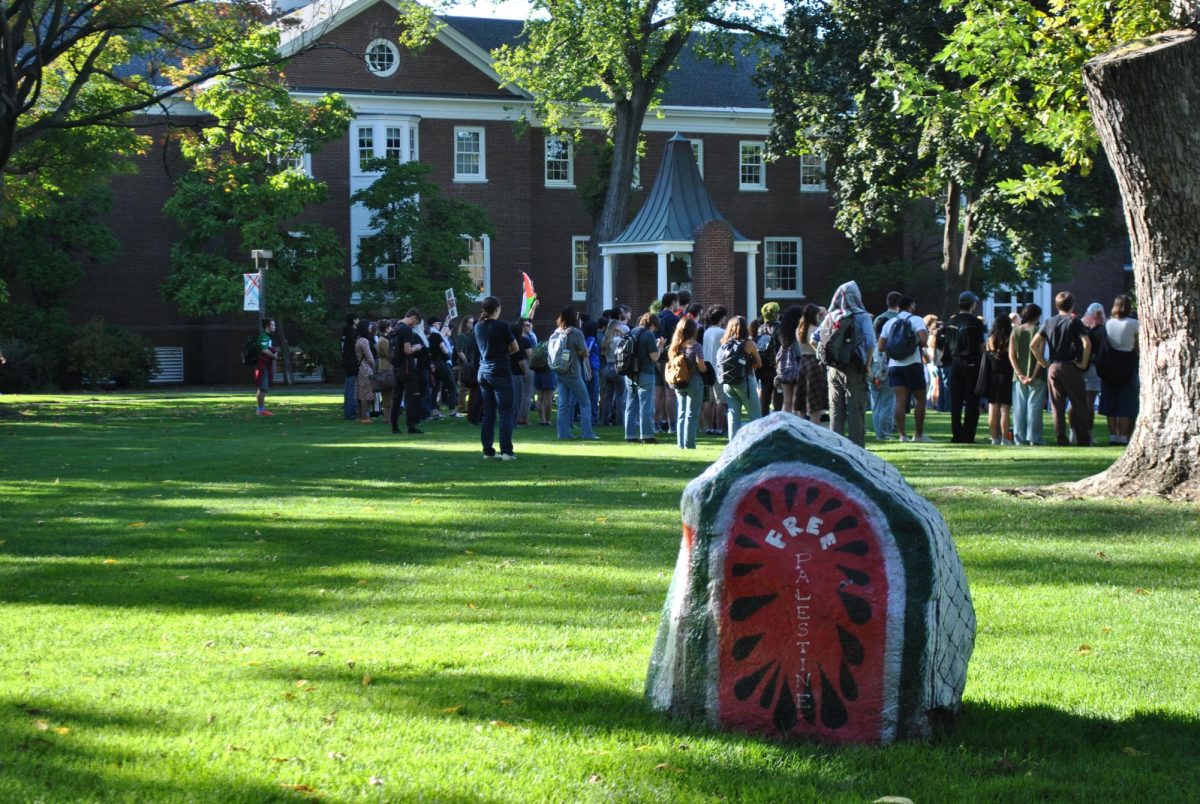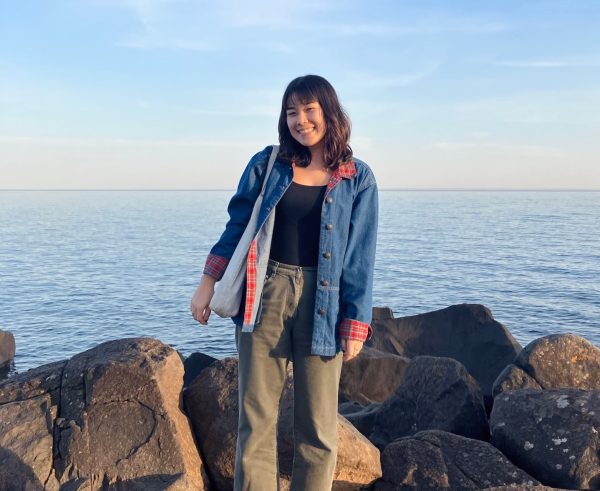Since the escalation of the Israeli genocide against the Palestinian people nearly one full year ago on Oct. 7, 2023, Macalester community members have continued to engage in conversations surrounding Israel and Palestine through various means. These included participating in student-organized rallies, sharing input on Mac for Palestine’s proposal submitted to the Board of Trustees (BoT) calling for divestment and attending both lectures and discussion-based events.
The recent cancellation of one such Macalester-sponsored event — a planned panel discussion on divestment titled “Divestment and Effective Strategy for Change” — has sparked questions and concerns among some community members about what critical dialogue looks like across campus.
This June, Lealtad-Suzuki Center for Social Justice (LSC) Director Hana Dinku began forming the foundations for this discussion that would have examined the feasibility and effectiveness of divestment as a strategy as part of the LSC’s ongoing Critical Dialogue Series.
Dinku hoped that the event would serve as an educational conversation for students unsure of their position on divestment and for those looking to supplement their perspective with new insights. In an effort to achieve this, Dinku coordinated with the authors of Mac for Palestine’s financial divestment proposal, as well as grassroots community organizer Taher Herzallah and anti-war activist and Carleton College’s former Vice President and Treasurer Fred Rogers.
“The idea was for our community to hear from these folks who have certain expertise, and then to discuss, to engage in dialogue about how this either affirms or contradicts our understandings of divestment, understandings of the Macalester [divestment] proposal, and then make meaning of that for ourselves,” Dinku said.
Mac for Palestine’s academic divestment proposal co-author OSB ’26 corresponded throughout the summer with Dinku. OSB, along with Charlie Gee ’26, a financial divestment proposal co-author, were going to be paid — along with other invited speakers — for their work in serving on the panel.
OSB was excited about contending with different ideas about best strategies for change, discussing diverging perspectives within the same goal and learning from older generations of activists. Herzallah currently serves as the director of outreach and grassroots organizing at American Muslims for Palestine (AMP) and has participated in several historic actions, including a disruption of Israeli ambassador Michael Oren’s speech in 2010, leading to his arrest and earning him the title of one of the ‘Irvine 11.’
“It would have been such an honor to sit on a panel with [Taher Herzallah], as a young student activist [who looks] up at someone who has been doing this work for so long,” OSB said. “Fred Rogers was coming at it from a pro-Palestine perspective, which he shared with us in this Zoom call that we had prior to the event. But while he supports Palestine, he was VP [and Treasurer] at Carleton … and he was going to share why he thinks divestment might not be the most effective strategy for change-making within institutions.”
In the weeks leading up to the event, Dinku received communication that the event conflicted with the BoT’s planned times for feedback sessions on the divestment proposal. In meetings with Vice President for Institutional Equity Alina Wong following this communication, Wong had asked Dinku several questions and outlined concerns about the programming.
“It felt like with every meeting, there was kind of a different set of questioning about the program and why I was doing it,” Dinku said.
After initial meetings, Wong told Dinku she would contact President Suzanne Rivera to discuss the feasibility of the event. Following a meeting with Wong on Sept. 9 — where Wong asked Dinku to shift the prescribed focus of the event away from Mac for Palestine’s proposals, remove student speakers and change the title of the event — Dinku felt that she had an obligation to cancel the event.
Shortly after this meeting, Dinku met on a Zoom call with all of the scheduled speakers, where she told them the event would need to be canceled. Wong told The Mac Weekly that she was only concerned with the event’s timing. Wong’s objection was that it would take place at the same time as the Ad Hoc committee deliberated.
“I didn’t want to undermine the work of the Mac for Palestine student organizers, nor the work of the ad hoc committee,” Wong said.
Wong also clarified that she did not mean for her recommendations surrounding the event’s structure to avoid discussing divestment for Palestine, but that she did not want Palestine to be the advertised focus of the event.
“When I say an ‘open conversation,’ I don’t mean that we have to avoid any specific things, but with the framing of the critical dialogue, that it would really be an organic conversation — that the participants are able to raise the questions that they want to raise, and if they want to talk specifically about Israel and Palestine, to absolutely support that,” Wong said.
Dinku explained that senior leadership’s response to her plans for the event — recommending that she change the structure, including uninviting students to participate in the panel — generated a lot of disappointment from those who had been part of the planning process.
“Obviously, there was a lot of frustration from everybody involved,” Dinku said. “It doesn’t feel good. This is a program we’ve been working on a really long time, and … I was very excited for this because I thought it was going to be a really interesting and nuanced dialogue for anybody involved. … I was really excited for it because I think it was going to be something that really would challenge whoever was participating or whoever joined.”
Dinku also emphasized that the purpose behind the event aligned closely with the LSC’s reasons for transitioning from the Department of Multicultural Life to a center oriented towards social justice — its cancellation stood in contrast to the college’s support of the LSC’s mission and values.
“If we call ourselves a social justice center, I think we would be doing a disservice to our students or our community for us to avoid this because if we’re not doing it, who should be doing this?” Dinku said. “We watched a lot of our students protesting, a lot of our students engaged in really difficult conversations all through last year, and so what we can provide is a space for dialogue to help our community understand these issues better. That’s the least we can do.
“This is something that we are all on the same page about. This is the work that we wanted to do, and so it feels a little jarring now that we are doing it, that there would be any kind of opposition to this kind of work.”
Gee expressed a similar sentiment, stating that challenging attendees’ ideas about divestment and pushing them to think about the issue in new ways was one of the key initiatives behind the event.
“I was told that admin was worried that [the event] would impact the Board vote and decision, but to me, that’s an educational event, and if a student goes to that event and takes something different away, that’s a good thing,” Gee said.
From OSB’s perspective, avoiding discussions about what’s happening in Palestine underlies the pushback that Dinku received surrounding the event. She believes that the Macalester administration strives to maintain ‘institutional neutrality,’ explaining why members of senior leadership offered evasive suggestions in order to convey interest in engaging with the issues at hand without actually participating in those conversations.
“I think that freedom of speech is a deliberately empty principle that liberal institutions use to try to peacefully mediate different political views without any apparent regard for the content of these views in service of this abstract goal of having dialogue across difference,” OSB said. “Meanwhile, the actual politics that these institutions are promoting is obfuscated under the banner of neutrality. … Why didn’t [the administration] just outright say something about this event? Because they want to seem neutral.
“… But at the end of the day, it’s a tactic … [and] what it does is it changes the conversation. We’re stuck having conversations around how to have the conversation, and we never actually get to having the conversation.”
Gee feels like the cancellation of the event reflects a disconnect between students’ and administration’s goals for these conversations.
“I think that, like in classes, there’s been a lot of space open for grief, space open for people to talk about how they’re feeling and questions that they have … and then it’s stuff like this: why did [the administration] cancel this event?” Gee questioned. “There’s such a disconnect, and then sometimes when we try to talk, it’s like we’re talking in circles. I think that’s at the core because we do have different interests — maybe students want to hear from student organizers, but admin doesn’t.”
Maintaining respect for one another while engaging in difficult conversations where disagreement may arise is something that Wong believes the Macalester community is “dedicated” to, sharing that it is “one of the reasons why [they] came to work at Macalester, and also one of the reasons why [they] stay.” But she also believes that when it comes to critical dialogue across campus, it’s important to think about different forms of participation.
“There’s so much happening everywhere all the time that I think sometimes it can also feel really overwhelming,” Wong said. “[It is important to know] that there are many different ways to approach equity and social justice work.”
For Dinku, the cancellation served as a reminder that the Macalester community should continuously reflect on what critical dialogues look like here, and what types of conversations are accepted on campus.
“Given things that are happening on different campuses, Mac may not be anywhere near the kind of things that we’re seeing that’s coming from different campuses, but I think it’s still healthy for us to review our practices, our policies, how we make decisions, what we can talk about, what we can’t talk about,” Dinku said. “I think this is one of the opportunities to think about why we can do some things and not others.”






